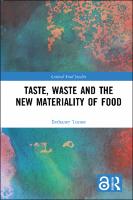Taste, Waste and the New Materiality of Food
Proposal review
| dc.contributor.author | Turner, Bethaney | |
| dc.date.accessioned | 2022-11-16T13:33:35Z | |
| dc.date.available | 2022-11-16T13:33:35Z | |
| dc.date.issued | 2019 | |
| dc.identifier | OCN: 1076945801 | |
| dc.identifier.uri | https://library.oapen.org/handle/20.500.12657/59261 | |
| dc.description.abstract | Anthropocentric thinking produces fractured ecological perspectives that can perpetuate destructive, wasteful behaviours. Learning to recognise the entangled nature of our everyday relationships with food can encourage ethical ecological thinking and lay the foundations for more sustainable lifestyles. This book analyses ethnographic data gathered from participants in Alternative Food Networks from farmers’ markets to community gardens, agricultural shows and food redistribution services. Drawing on theoretical insights from political ecology, eco-feminism, ecological humanities, human geography and critical food studies, the author demonstrates the sticky and enduring nature of anthropocentric discourses. Chapters in this book experiment with alternative grammars to support and amplify ecologically attuned practices of human and more-than-human togetherness. In times of increasing climate variability, this book calls for alternative ontologies and world-making practices centred on food which encourage agility and adaptability and are shown to be enacted through playful tinkering guided by an ethic of convivial dignity. This innovative book offers a valuable insight into food networks and sustainability which will be useful core reading for courses focusing on critical food studies, food ecology and environmental studies. | en_US |
| dc.language | English | en_US |
| dc.relation.ispartofseries | Critical Food Studies | en_US |
| dc.subject.classification | thema EDItEUR::T Technology, Engineering, Agriculture, Industrial processes::TQ Environmental science, engineering and technology | en_US |
| dc.subject.classification | thema EDItEUR::R Earth Sciences, Geography, Environment, Planning::RG Geography | en_US |
| dc.subject.classification | thema EDItEUR::R Earth Sciences, Geography, Environment, Planning::RG Geography::RGC Human geography | en_US |
| dc.subject.classification | thema EDItEUR::J Society and Social Sciences::JB Society and culture: general::JBC Cultural and media studies::JBCC Cultural studies::JBCC4 Cultural studies: food and society | en_US |
| dc.subject.classification | thema EDItEUR::T Technology, Engineering, Agriculture, Industrial processes::TD Industrial chemistry and manufacturing technologies::TDC Industrial chemistry and chemical engineering::TDCT Food and beverage technology | en_US |
| dc.subject.other | Environmental science, engineering and technology;Geography;Human geography;Cultural studies: food and society;Food and beverage technology | en_US |
| dc.title | Taste, Waste and the New Materiality of Food | en_US |
| dc.type | book | |
| oapen.identifier.doi | 10.4324/9780429424502 | en_US |
| oapen.relation.isPublishedBy | 7b3c7b10-5b1e-40b3-860e-c6dd5197f0bb | en_US |
| oapen.relation.isFundedBy | Knowledge Unlatched | |
| oapen.relation.isbn | 9780429755200 | en_US |
| oapen.relation.isbn | 9781472487544 | en_US |
| oapen.relation.isbn | 9780367583071 | en_US |
| oapen.collection | Knowledge Unlatched (KU) | |
| oapen.imprint | Routledge | en_US |
| oapen.pages | 247 | en_US |
| peerreview.anonymity | Single-anonymised | |
| peerreview.id | bc80075c-96cc-4740-a9f3-a234bc2598f1 | |
| peerreview.open.review | No | |
| peerreview.publish.responsibility | Publisher | |
| peerreview.review.stage | Pre-publication | |
| peerreview.review.type | Proposal | |
| peerreview.reviewer.type | Internal editor | |
| peerreview.reviewer.type | External peer reviewer | |
| peerreview.title | Proposal review | |
| oapen.review.comments | Taylor & Francis open access titles are reviewed as a minimum at proposal stage by at least two external peer reviewers and an internal editor (additional reviews may be sought and additional content reviewed as required). |

